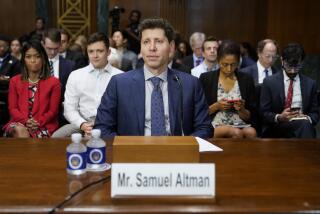Senate Committee Chides Enron Board
- Share via
WASHINGTON — Enron Corp.’s board of directors--which has insisted that it was kept in the dark about the energy company’s financial problems--was warned in early 1999 that the company’s accounting practices “push limits,” according to documents released Tuesday during a hearing about the board’s role in Enron’s collapse.
But the board ignored the warning and other red flags because the directors were reluctant to challenge and question the executive officers of the once-hot company, lawmakers said.
Even after learning from newspaper accounts in October 2001 that the company’s chief financial officer had pocketed millions of dollars by running off-the-books partnerships, board members hesitated to broach the topic. They asked Enron attorneys to script a set of questions that they could ask and began the session by thanking Chief Finanacial Officer Andrew Fastow for his “willingness to visit with us,” documents show.
“You can’t get more deferential and obsequious than that,” said Sen. Carl Levin (D-Mich.), chairman of the Senate permanent subcommittee on investigations, which is looking into Enron’s collapse.
Separately, Levin said the committee is investigating possible insider trading by a former senior Enron officer who asked his stock broker to sell some of his Enron holdings shortly before the company released its Oct. 16 earnings report, in which Enron first disclosed a $1.2-billion charge against equity, related to the Fastow partnerships.
“I think we may want to sell some [Enron] calls in the next few days before earnings are released,” the executive wrote Oct. 2. “I don’t know anything, but I know how [Enron] works and I’m sure they will be able to show strong recurring earnings, but with the market where it is and the stock where it is, I expect them to take that opportunity and do some housecleaning on some non-productive assets.”
At the time he wrote the e-mail, the executive was in the process of leaving Enron, Levin said. He declined to identify the man, but said the committee may refer the matter to the Securities and Exchange Commission.
During a daylong hearing, Levin and other lawmakers chided five of Enron’s current and former board members for failing to protect investors by keeping tabs on the company’s complex financial dealings and standing up to management.
Sen. Joseph Lieberman (D-Conn.) called some of the board’s actions “extraordinarily irresponsible,” particularly in light of the fact that board members profited handsomely from Enron stock sales and other compensation, averaging $329,000 a year.
“The board of directors didn’t just fiddle while Enron burned,” Lieberman said. “They toasted marshmallows over the flames.”
Enron directors defended their record, shifting blame to Enron managers and Arthur Andersen, which audited the company’s books.
Several also said it was unrealistic to expect part-time board members to uncover hidden problems in a large, complex corporation such as Enron.
“We cannot, I submit, be criticized for failing to address or remedy problems that were concealed from us,” said Herbert Winokur Jr., who chaired the board’s finance committee.
Levin tried to show that the board did, in fact, receive several warnings, including one from former Andersen auditor David Duncan, who told the board’s audit committee in February 1999 that some of Enron’s accounting practices were risky.
Robert Jaedicke, former audit committee chair, said he did not recall the specific warning, but conceded that the board had been told on several occasions that Enron’s practices were complex and risky. He said the board relied heavily on Andersen’s professional judgment.
More to Read
Inside the business of entertainment
The Wide Shot brings you news, analysis and insights on everything from streaming wars to production — and what it all means for the future.
You may occasionally receive promotional content from the Los Angeles Times.










